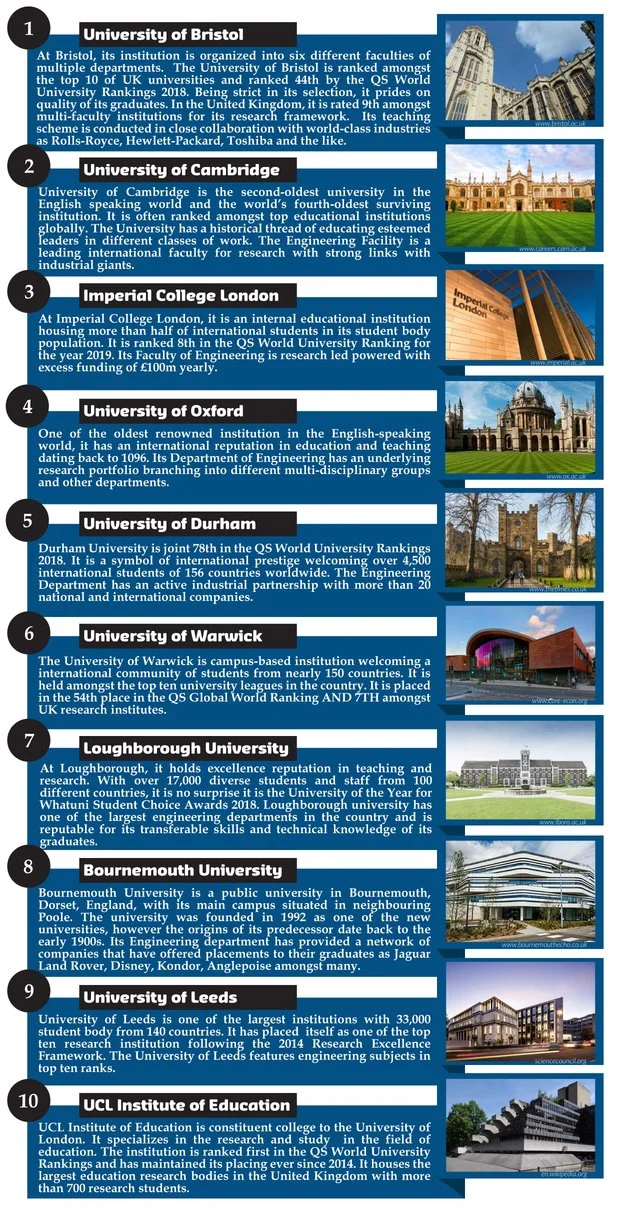Based on figures reported by the Higher Education Funding Council, UK universities are ranked as some of the best engineering institutions in the world. They offer wide exciting career paths in different industries from automation, manufacturing and IT technologies.
Local and International students will have the golden opportunity to develop not only their skills but also hone their English speaking and writing skills. England’s long-standing engineering institutions are structured in a way that supports international students, making sure they fully experience the British culture.
What is engineering? Who is an engineer?
Engineers are great agents of society. Combining a wide use of science, mathematics, and technology, engineers are responsible for everything we see and use in our everyday lives. By virtue of investigative research and innovative solutions, engineers are responsible for developing new ideas into reality to meet societal and consumers needs. With the huge developments we’re seeing in technology and science, engineering graduates can expect to remain high in-demand.
The field of engineering is divided into a large number of specialty areas. At the heart of it, it is discipline dedicated to finding solutions to society’s problems. They figure how things work and how to make innovations better and available for everyday use.
What common skill set does it take to be a good engineer?
- Teamwork - You thrive in a team setting. You are able to express yourself and communicate your ideas clearly with others.
- Attention to detail - You care for the level of accuracy in each of your tasks. You strive for perfection.
- Innovation - You are capable of making bold flow of ideas and develop it into action.
- Communication - You are able to relay information in a concise manner that can be understood by people in different departments, current and potential clients.
- Resilience and Self-Discipline - You are able to perform well under pressure and demonstrate perseverance in case of setbacks.
Entry Requirement
The entry requirements vary across the UK. Typically, mathematics and physics subjects are required.
Below are the typical entrance requirements to an Engineering degree course in the UK:
- A-level Requirements: AAB (Mathematics, Additional Mathematics or Physics)
- IELTS Requirements: Band 7.0
Please note that applicants require a visa to study in the UK and it may be required to provide valid evidence of English language tests. Applications who fail to provide eligible test within the time frame would need to retake the suitable English language tests.
Choosing an Engineering field
- Civil Engineering: It is the branch of engineering that deals with the design, construction, maintenance of public and physical operations of infrastructure such as roads, bridges, and railways. Civil Engineers assess the project developments based on its construction costs, regulatory rules as well as potential impacts on the surrounding environment.
- Chemical Engineering: It is the field of engineering that equips the principles of chemistry, mathematics, physics, and economics to convert raw materials and energy into different products as well as efficiently operating plants and equipment. Chemical Engineers also go by, process engineers. They are posted in industrial plants, refineries and operational offices.
- Computer Engineering: It is an engineering discipline that combines fields of electronics and computer science to develop computer hardware and software. Computer Engineers are made up of two forms; software and hardware engineers. A Computer Hardware Engineer is a professional who test, operate and install computer hardware whist a Computer Software Engineer is a person that is responsible for designing and creating new software.
- Electrical Engineering: It is a discipline that deals with the study and the application of different components of devices and systems. Their skills are widely needed in a number of industries. They perform supervision on equipments and perform test runs to make sure it is properly functioning.
- Aeronautical Engineering: It is a branch of engineering that is concerned with the research, design, and manufacturing of aircraft and spacecraft. Aeronautical Engineers often specialise in one of two engineering types; aeronautical or astronautical. Aeronautical Engineers work on the practice of aircraft wihtin the earth’s atmosphere whilst Astronautical Engineers test on the performance of flight in and outside of earth’s atmosphere.

How long will my courses last?
UK universities offer two different types of engineering programmes;
| Programme | Duration |
| Bachelor of Engineering | 3 years |
| Master of Engineering | 1 year |
Annual Undergraduate Tuition Fees 2018
Generally, the tuition fees vary in the type of degree programmes you choose to take. The fees are calculated in GBP pounds per year. A Bachelor’s degree program in Engineering is comparatively more expensive than an Art and Humanities program. Course programmes are pricier in major cities than it is to smaller, less concentrated cities. Applicants should refer to the tuition fees in the university website for the respective programme fees.
The Tuition fees are subjected to annual increment and vary across the institutions.
| Study level | Approx entire tuition fee |
| Bachelor’s Degree | RM53, 400 - RM202,300 |
| Masters Degree | RM58, 700 - RM170, 900 |
 +60173309581
+60173309581









